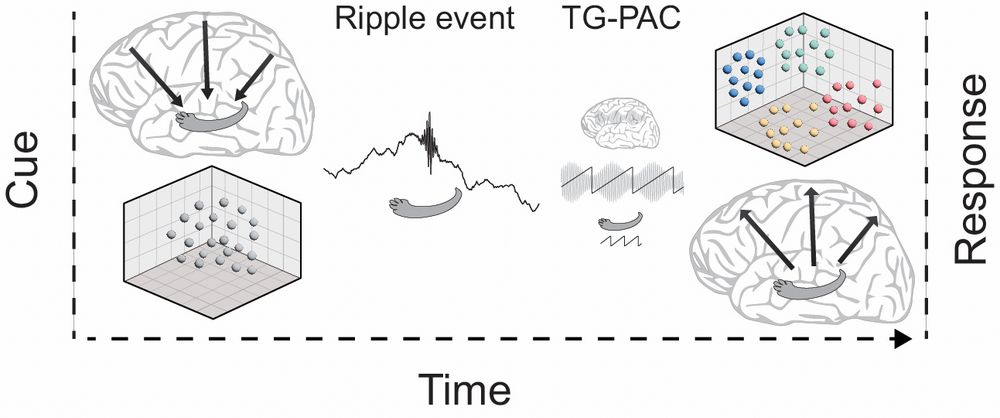The best retrieval cue matches the memory now,
not just how it was encoded.
Always a pleasure working with @lindedomingo.bsky.social.
Amusing summary below courtesy of ChatGPT:

The best retrieval cue matches the memory now,
not just how it was encoded.
Always a pleasure working with @lindedomingo.bsky.social.
Amusing summary below courtesy of ChatGPT:
We found theta–gamma phase–amplitude coupling (TG-PAC) between hippocampus and cortex right after ripples.
TG-PAC peaks before cortical expansion, suggesting it may help coordinate the shift from compressed hippocampal codes to expanded cortical states.

We found theta–gamma phase–amplitude coupling (TG-PAC) between hippocampus and cortex right after ripples.
TG-PAC peaks before cortical expansion, suggesting it may help coordinate the shift from compressed hippocampal codes to expanded cortical states.
Cortical dimensionality expands — neural patterns spread apart, making memories easier to decode.
More expansion → Faster retrieval and more reinstatement.
This raised a question:
🧠 What mechanism is driving this cortical transformation?

Cortical dimensionality expands — neural patterns spread apart, making memories easier to decode.
More expansion → Faster retrieval and more reinstatement.
This raised a question:
🧠 What mechanism is driving this cortical transformation?
More ripples on correct vs. incorrect trials 📈
Ripples cluster before memory responses ⏳
Timing suggests ripples help initiate retrieval, not just reflect it.

More ripples on correct vs. incorrect trials 📈
Ripples cluster before memory responses ⏳
Timing suggests ripples help initiate retrieval, not just reflect it.
🌟 Hypothesis: Ripples trigger a shift from compressed to expanded neural representations in cortex, making memories readable again.

🌟 Hypothesis: Ripples trigger a shift from compressed to expanded neural representations in cortex, making memories readable again.
We recorded iEEG from patients during memory retrieval... and found something really cool 👇(thread)

We recorded iEEG from patients during memory retrieval... and found something really cool 👇(thread)





